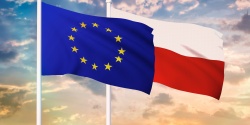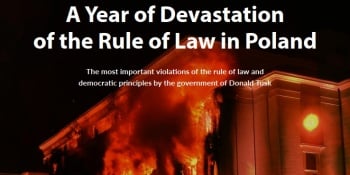Published: 25.04.2022

On April 20, 2022, the Ordo Iuris Institute for Legal Culture organized a conference in the European Parliament (EP) building in Brussels in cooperation with the office of Witold Waszczykowski, Member of the European Parliament (MEP).
The conference “Rule of law in the EU: A concern for democracy or an assault on sovereignty?" was one of the events summing up the months’ long "Conference on the Future of Europe", where the vision of the future of the European Union and European countries was debated.
The voice of socialists and liberals in the EU calling for the "fastest and uncompromising" construction of a centralized European superstate through the complete elimination of nation states, even against the will of the Europeans themselves, is extremely strong. Therefore, the Ordo Iuris Institute decided to invite to the debate the MEPs and representatives of the world of science who do not support the federalist tendencies prevailing in the EU and who notice the attempt to use the principle of the rule of law in an instrumental way to achieve political goals.
The speakers included MEPs from Poland (Mr. Witold Waszczykowski), Hungary (Mr. Ernő Schaller-Baross), Spain (Mr. Jorge Buxadé Villalba), Germany (Mr. Nicolaus Fest and Mr. Gunnar Beck) and representatives of the word of science: Mr. Henk Jan van Schothorst from Christian Council International and Mr. Attila Kovács from the Center for Fundamental Rights.
The first speakers were Ms. Weronika Przebierała, Director of the Ordo Iuris Center for International Law, and att. Ms. Joanna Modrzewska, an Ordo Iuris analyst, who presented the main theses of the Ordo Iuris report on the rule of law. This publication is a collection of numerous analyses related to the issue of the rule of law in Poland, prepared by the Institute's experts in recent years. Att. Modrzewska pointed out that the accusations that the EU directed against Poland are not supported by facts, are based on dubious substantive foundations, and their main reason is an attempt to exert political pressure on Poland.
The next speaker, MEP Witold Waszczykowski, who has many years of political experience as a member of the Polish Parliament, Minister of Foreign Affairs of Poland, a MEP for many years, and who has been involved in the "dispute over the rule of law" led by the Union, clearly indicated that this issue is political in nature. The legal possibilities offered by the treaties to the EU to protect the rule of law are only a tool for political struggle. He pointed out that "the rule of law" is only mentioned in Art. 2 of the Treaty on European Union (TEU). No legally binding document has a definition of the rule of law that could regulate how the issue should be understood. He also mentioned the intensification of attacks on Poland and further escalation of demands may have been encouraged by a mistake of the Polish government, which in 2018 decided to make concessions to the objections of the European Commission. "I hope we can find a way to escape from this trap," said MEP Waszczykowski and thanked Ordo Iuris for raising the topic of the rule of law.
The Spanish perspective on art. 2 TEU and the ongoing battles for the rule of law in the EU were presented by MEP Jorge Buxadé Villalba. The MEP quoted an article of the Spanish constitution which clearly indicates that the rule of law in Spain is a requirement of the Constitution, which at the same time indicates freedom, justice, equality and political pluralism as the highest values of its legal order, while the the nation remains the sovereign. This definition is clear and indisputable. Therefore, from the Spanish perspective, the Union cannot and should not become anything more than what is set out in the Treaties. These documents contain its goals and competences. The attempts to go beyond their content should be read as a fraud against the countries that acceded to the EU. "Contained in Art. 2 of the EU Treaty, the concept of the rule of law cannot be understood as the intention of the European Parliament to adopt a specific ideology” explained Buxadé. He also recalled that the EU itself undertook in its treaties to respect the constitutions of its member states.
Ernő Schaller-Baross, MEP from Hungary, pointed to the dangerous tendencies of the EU, which is trying to exceed its competences and impose top-down ideological solutions on the member states. “From a Hungarian point of view, we cannot accept any regulation of a EU body that is not based on intergovernmental dialogue. This is clearly the case with the rule of law debate. Building the future of Europe and the integration process must be based on the trust which the EU institutions lack” said Schaller-Baross.
The next two speakers, MEPs from Germany, showed numerous inconsistencies in the EU's accusations against Poland, pointing to much worse practices prevailing in Germany.
MEP Gunnar Beck emphasized that the rule of law is, in a fundamental meaning, a state in which law is above authority, everyone is equal before the law and no one is above the law. "The rule of law is a wall that protects citizens from unrestrained government," explained Beck. He pointed out that in the concept of democracy advocated by the EU, "the rule of law" is used instrumentally and he gave an example of Germany, where judges are elected by politicians, to which the EU has no objections, and Poland, where politicians gained some influence on the selection of judges, which has been immediately recognized by the Union as an infringement of the law. "We all agree here that the judiciary must be independent and that it is an element of the rule of law" - emphasized Beck and added that, at the moment, in the EU's opinion, everything that is in the treaties is an element of the rule of law. It includes things such as, for example, the fight against climate change. The Court of Justice of the EU is granted powers to blackmail member states.
Dr Nicolaus Fest, a German MEP who wrote a report on the rule of law in Germany for the EU LIBE committee, presented examples of violations of the rule of law he identified in his report and compared "alleged deficits of the rule of law in Poland with those in Germany."
He recalled, among others, the election of the Free Democrats candidate for the prime minister of Thuringia, which was simply declared invalid by the then Chancellor Angela Merkel, and pointed out that in Poland elections are not invalidated even if their results do not please the political elite. In Poland, unlike in Germany, there is also no electoral mess. "During the election for the Berlin House of Representatives, 1600 invalid ballot papers were issued, 5000 ballot papers were not issued at all, 73 polling stations were temporarily closed and in other three polling stations the election was cancelled because of missing ballot papers”, Fest said. Referring to the EU's allegations of lack of the rule of law in Poland, he pointed out that it is in Germany, and not in Poland, that a member of the ruling party may become a judge of the Supreme Constitutional Court. “There are many reasons why Germany, and not Poland, should be examined more closely with regard to the rule of law. And this is also a general idea of my report in the LIBE Committee of the EU Parliament. [...] The leftists do not want to accept reality. The leftists want to falsify this reality to suit themselves. None of the arguments in my report can be refuted. But these people don't care. These people are not concerned with the rule of law. These people are not concerned with preserving democracy. These people only use these slogans to impose their own leftist and totalitarian ideas on the people. The Poles are an eyesore for them” emphasized the MEP. Fest also thanked for the work of Ordo Iuris and, noting that most NGOs today are dominated by the political left, indicated that more think tanks such as the Institute are needed.
Then representatives of the academic world and non-governmental organizations took the floor. Henk Jan van Schothorst, director of Christian Council International, defined the EU's aspirations to introduce "global rule of law" in a postmodern EU with redefined "new" human rights. "Instead of guaranteeing classic civil rights for all, the state, in the imagination of globalist human rights activists, would become an arbiter, implicitly enforcing the rights claimed by certain groups against others: Women against unborn children; children against parents; adherents of gender identity ideology against adherents of the traditional Christian view of humanity; and Muslim immigrants against those concerned with maintaining Western values”, warned van Schothorst.
Attila Kovács spoke on behalf of the Hungarian Center for Fundamental Rights. As previously did MEP Waszczykowski, Mr. Kovács also pointed out that the rule of law is not defined and understood in the same way in each of the EU Member States. Although the Union declares that its pillar is "union in diversity", it does not want to respect the diversity in the political culture that shapes the concept of the rule of law of individual states. "There are shared values, but there are also different historical, cultural, institutional background in the Member States that has an impact on checks and balances, media ownership, etc. [...] Meanwhile, the rule of law mechanism changes the interinstitutional balance and competencies of EU bodies without modifying the Treaties. [...] The left-wing Brussels “elite” considers democracy a threat to their “enlightened” approach to politics and to the concept of federal Europe. Therefore, they need new tools in order to curb and “correct” the will of the people expressed in democratic elections: the most recent tool is the rule of law mechanism" - said Mr. Kovács exposing the so-called the rule of law mechanism.
The lectures were rich in interesting reflections encouraging further discussion and were followed by a short question and answer session, which further developed the debate on the rule of law in the European Union.
In addition to creating a space for discussion, the conference was also extremely important in building the awareness of recent developments in this area, especially in the context of the following events: the February rejection by the Court of Justice of the European Union of a complaint submitted by Poland and Hungary regarding the conditionality mechanism and the March adoption by the European Parliament of a resolution calling on the European Commission to suspend the payment of monies from the EU Reconstruction Fund to Poland under the pretext of an alleged disregard for "European values".
The conference clearly and precisely indicated what the rule of law really is. The representatives of Poland, Hungary, Spain, the Netherlands and Germany identified coherently the disease afflicting the EU: the attempt to achieve particular political and ideological goals by instrumentalizing the law and attempting to violate the sovereignty of the member states.
Anna Kubacka - analyst of the Ordo Iuris Center of the International Law

03.02.2025
The following updates and adds to an earlier list of violations that was published in October 2024.

31.01.2025
• The European Commission has announced the inclusion of a revised Code of Conduct on Countering Illegal Hate Speech Online in the Digital Services Act.

17.01.2025
• Over a year has passed since Donald Tusk’s latest government was established in Poland.

02.01.2025
• The results of the latest report, EU Gender-based Violence Survey – Key Results, on the topic of violence against women, which includes data from 27 member states, show that Scandinavian countries such as Denmark, Finland, and Sweden have some of the highest rates of violence against women (52%, 47%, and 46%, respectively).